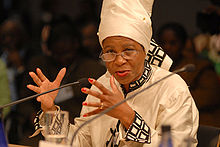Mamphela Ramphele
|
Mamphela Ramphele MBChB; PhD |
|
|---|---|
 |
|
| Born |
28 December 1947 Bochum District, Transvaal, South Africa |
| Nationality | South African |
| Known for |
Anti-apartheid activist Agang South Africa Former Managing Director of the World Bank |
| Partner(s) | Steve Biko |
| Children | Hlumelo Biko |
Mamphela Aletta Ramphele (/ˈmʌm.piːlə ˈrʌm.piːliː/; born 28 December 1947) is a South African politician, a former activist against apartheid, a medical doctor, an academic and businesswoman. She was a partner of anti-apartheid activist Steve Biko, with whom she had two children. She is a former Vice-Chancellor at the University of Cape Town and a one-time Managing Director at the World Bank. Ramphele founded political party Agang South Africa in February 2013 and withdrew from politics in July 2014.
Ramphele was born in the Bochum District in Northern Transvaal (now Limpopo). She completed her schooling at Setotolwane High School in 1966 and subsequently enrolled for pre-medical courses at the University of the North. Her mother, Rangoato Rahab, and her father, Pitsi Eliphaz Ramphele were primary school teachers. In 1944, her father was promoted as headmaster of Stephanus Hofmeyer School. Ramphele contracted severe whooping cough at the age of three months. The wife of the local reverend, Dominee (Reverend) Lukas van der Merwe, gave her mother medical advice and bought medicines for the sick child that saved her life.
In 1955, Ramphele witnessed a conflict between a racist Dominee (Afrikaner Church minister) and the people of the village of Kranspoort that also contributed to her political awakening. The dispute centred on whether the mother of a villager could be buried in the mission graveyard. The Dominee refused to allow the burial since he considered the woman to be a heathen who had not converted to Christianity. In defiance, local villagers took control of the church grounds and buried the woman. In revenge, the furious Dominee enlisted the police and banished all of the villagers who were involved in the burial and those known to be sympathetic to their cause. Two thirds of the villagers were cast out, losing their property in their rush to escape the violent police; lawlessness followed on the parts of both the villagers and the police. Ramphele interpreted this as her first experience of blacks' defiance of the apartheid system.
...
Wikipedia
